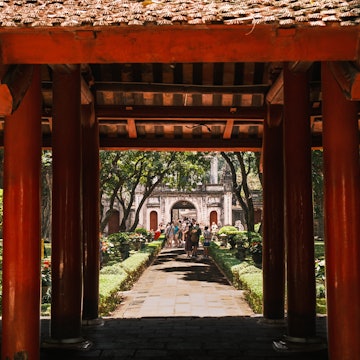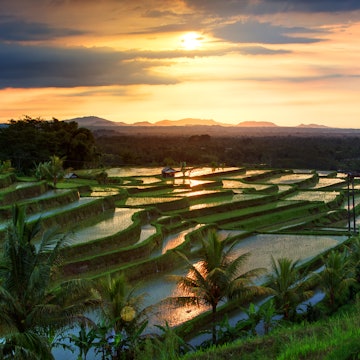

Geena works online and travels full-time. © Geena Truman
I've canoed into the depths of the Colombian Amazon, trekked through the dense jungles of Sumatra, and experienced the thrill of riding a tuk-tuk through the death-defying streets of India. But returning to Bali may have been the most harrowing experience of my life.
During my first trip in 2015, the island captivated me. I was enthralled by the carefully crafted Canang sari decorating the streets and rich cultural traditions. But when I returned in 2020, Bali was a different island entirely. Gone were the warungs serving Babi Guling and Ayam Lawar. Instead, trendy Instagram cafes serving smoothie bowls and eggs benedict lined the streets. Temples that once held worshippers were now dramatic backdrops for TikTok content creators. Meandering down a street filled with coworking spaces and yoga studios I realized I could be in any city in the world.
The world is rapidly changing. Technology and globalization have spurred massive development in countries all around the globe. In destinations such as Tulum and Bali, this development has come at a cost – the cheapening of entire cultures. They have slowly transformed from cultural epicenters brimming with local food options, cultural experiences, and guesthouse bungalows to watered-down versions of what they once were – all in the name of catering to the needs of digital nomads.
And there are lots of digital nomads. Millions worldwide.

As Instagram "influencing" hit its peak, travel was easier than ever. More work became available online leading to a digital nomad boom. Entrepreneurs flocked to the serene beaches of Bali, Mexico, and Thailand to create their new "home away from home" and ended up changing the fabric of entire communities.
Let me be clear. I don't hate the digital nomad movement. I work online and travel full-time. But as the trend of digital nomadism has grown through social media, the brand of traveler taking the leap has changed. When destinations start catering to these new digital nomads, countries slowly begin to lose their cultural identities.
And with estimates from DNX back in 2015 projecting 1 billion digital nomads by 2035 (a pre-pandemic assumption) global homogenization could get a whole lot worse.
You might travel to the other side of the planet only to find that it looks much like the city you left back home.
What is the allure of travel?
As Anthony Bourdain once wisely noted, "Travel is about the gorgeous feeling of teetering into the unknown". Widening our perspectives, diving headfirst into the unfamiliar, and stepping outside our comfort zones. That's what brought many of us to remote work in the first place.
Those of us who are passionate about travel, live for that feeling of exploration. We seek out unfamiliar experiences to learn about the cultures and traditions of the world. But what happens when the entire world starts feeling a little too familiar?

The problem
Digital nomads aren't traveling in the true sense of the word. Often, they find a country that fits their needs and live there for several months at a time.
They want strong wi-fi, cheap comfortable long-term lodging, coworking cafes, Instagrammable food, and a community of like-minded individuals to share their experiences with.
And there's nothing inherently wrong with that. But it's changing the landscape of the world for "typical" travelers.
Authentic local dishes are harder to come by. Locals open "vegan" restaurants knowing it will sell better than the succulent slices of Babi Guling (whole roast pig) that the Balinese perfected over hundreds of years. Guesthouses close their doors as trendy Instagrammable Airbnb's backed by foreign investors thrive. Coffee coworking spaces pop up on every corner drawing in more and more of the digital nomad crowd while slowly pricing locals out of their communities.
Airbnb has been blamed globally for a dramatic rise in rent prices, driving locals to the outskirts of cities. But digital nomads thrive off Aibnb's comfortable weekly and monthly accommodation options and are willing to pay the heftier price-tag. And foreign-operated hostels catering to young digital nomads looking to "network" are no better.
Overtourism has been labeled the destination killer of the 21st century. And while still a major contributor, I think an influx of digital nomads may be an early signal of the destination's "cultural" demise.

The solution
Live immersively as a digital nomad. Support local businesses, cultural practices, and traditions just as you would back home. Consider the lifestyle of locals and the cuisine of a destination before you relocate there.
Too often digital nomads default to creating a bubble of comfortability around themselves. Befriending other digital nomads and bouncing from their hostel to their coworking place and bypassing the unfamiliar along the way.
For most, the main allure behind going remote in the first place was the ability to travel the world. But if you don't travel immersively and step outside your comfort zone are you really doing much travel at all? We're slowly killing the very thing that inspired us to travel in the first place. Unfamiliarity. Exploration. Curiosity.

As digital nomads, we have a huge responsibility laid on our shoulders. I'm all for more people working remotely, but now more than ever we should be conscious of our impact on the places we live. Because it's not just the environment we stand to lose. It's the diversity of our planet; our cultures and traditions. It's the very things that made us so passionate about travel in the first place.
Digital nomads have to be the kind of travelers they want to see in the world. Adventurous, enthusiastic, curious, and open-minded. Because with our ever-growing population, locals will continue to cater to what we want and that could just ruin travel for everyone else.
You might also like:
How to manage your money as a digital nomad
10 reasons why you should become a digital nomad in 2021
Everything you need to consider before becoming a digital nomad













